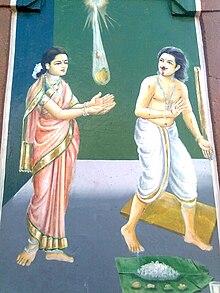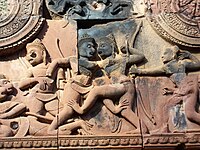Karaikkal Ammaiyar

Karaikal Ammaiyar (born Punītavatī), meaning "The Revered Mother of Karaikal", is one of the three women amongst the 63 Nayanmars and one of the greatest figures of early Tamil literature. She was born in Karaikal, South India, and probably lived during the 5th century AD.[1] She was a devotee of Shiva.[2][3]
Early life
[edit]
Karaikal was a maritime trading city in Chola Nadu. Ammaiyar, whose original name was Punitavati, was born to Dhanadattan in a merchant community known as Chettiar, popular tradition linking it with the Nattukottai Nagarathar community (also known as Nattukottai Chettiar).[4][5][6] She was married to Paramadattan, a wealthy merchant from Nagapattinam.[7]
Ammaiyar Image in Cambodia
[edit]Banteay Srei or Banteay Srey (Khmer: បន្ទាយស្រី [ɓɑntiəj srəj]) is a 10th-century Cambodian temple dedicated to the Hindu god Shiva. Located in the area of Angkor, it lies near the hill of Phnom Dei, 25 km (16 mi) north-east of the main group of temples that once belonged to the medieval capitals of Yasodharapura and Angkor Thom.[8]
The second enclosure
[edit]The inner enclosure wall has collapsed, leaving a gopura at the eastern end and a brick shrine at the western. The eastern pediment of the gopura shows Śiva Nataraja; the west-facing pediment has an image of Karaikal Ammaiyar, one of the three women saints amongst the sixty three Nayanmars (hounds of Śiva).[9]
Notes
[edit]- ^ Kōmati Cūriyamurtti (2003). Kāraikkālammaiyār (in Tamil). Sahitya Akademi (1st ed.). சாகித்திய அகாதெமி. ISBN 81-260-1645-0. OCLC 55679869.
- ^ V. K. Subramanian. 101 Mystics of India. Abhinav Publications, 2006 - Hindus - 219 pages. p. 33.
- ^ Rajarajan, R.K.K. (2018) Recollection of Memories: Hymns of Kāraikkālammaiyār - South Indian Śaiva Iconography. In Sudipa Ray Bandyopadhyay and Swati Mondal Adhikari, eds. Śaiva Iconography: A Facet of Indian Art and Culture. Kolkata: Sagnik Books, pp. 73-92 & 141-147 (Pl.VII.1-13). https://www.academia.edu/37515115/Recollection_of_Memories_Hymns_of_K%C4%81raikk%C4%81lammaiy%C4%81r_-_South_Indian_%C5%9Aaiva_Iconography
- ^ "Nagarathar children trace their roots". The Hindu. 16 August 2016. Retrieved 28 August 2017.
- ^ "Welcome to Nagarathar Ikkiya Sangam". nagaratharikkiyasangam.org. Retrieved 28 August 2017.
- ^ "Karaikkal Ammaiyar Temple, Karaikkal | Aalayangal Arputhangal | 04/01/2016 | Puthuyugam TV". YouTube. Puthuyugam TV. 4 January 2016.
- ^ Kodinhi, Hussain (15 July 2013). "Timeless myths that link two neighbours". The Times of India. Retrieved 19 October 2024.
- ^ Higham, The Civilization of Angkor, p.79.
- ^ "Across space and time". The Hindu. 29 March 2009 – via www.thehindu.com.
References
[edit]- Dallapiccola, Anna. Dictionary of Hindu Lore and Legend (ISBN 0-500-51088-1)
- Karavelane (in French). Kareikkalammeiyar, œuvres éditées et traduites, Institut français d'indologie, Pondicherry (1956)
- Jagadeesan, N. The Life and Mission of Karaikkal Ammaiyar Bhattacharya, N.N. [ed] Medieval Bhakti Movements in India Munishiram Manoharlal, New Delhi (1989), pages 149–161
- Rajarajan, R.K.K. (2018) Recollection of Memories: Hymns of Kāraikkālammaiyār - South Indian Śaiva Iconography. In Sudipa Ray Bandyopadhyay and Swati Mondal Adhikari, eds. Śaiva Iconography: A Facet of Indian Art and Culture. Kolkata: Sagnik Books, pp. 73–92 & 141-147 (Pl.VII.1-13). ISBN 978-93-84101-40-4.
- Schouten, Jan Peter (in Dutch). Goddelijke vergezichten – mystiek uit India voor westerse lezers, Ten Have b.v., Baarn, the Netherlands (1996), ISBN 90-259-4644-5
- de Bruijn, Peter. Kāraikkālammaiyār: Part 1: An iconographical and textual study; Part 2: Poems for Siva (ISBN 978-90-811564-1-7) 2007. 147 pp. colour, B/W plates.
- Craddock, Elaine Śiva's Demon Devotee: Kāraikkāl Ammaiyār, SUNY Press, Albany (2010), ISBN 978-1-4384-3087-4
- McGlashan, Alastair The History of The Holy Servants of the Lord Siva, page 161 Trafford (2006), ISBN 978-1-4120-7914-3
- Das, Sisir Kumar (2005). A History of Indian Literature, 500-1399: From Courtly to the Popular. Vol. 6. Sahitya Akademi. p. 31. ISBN 9788126021710.
External links
[edit]- Karaikal Ammaiyar
- Karaikkal Ammaiyar in Sri Lanka, article in Dutch on Karaikkalammaiyar myth theme diffusion in the arts of Ceylon and Southeast Asia
See also
[edit]Parayi Petta Panthirukulam, a Kerala folktale partly inspired by Karaikal Ammaiyar, with the figure of Karakkalamma, a pious noble lady


